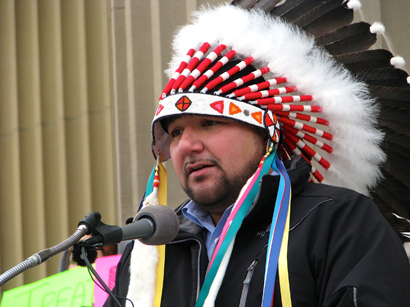By Jeremy Appel, Local Journalism Initiative Reporter
(ANNews) – Six First Nations groups, including the Confederacy of Treaty 6 First Nations and Treaty 8 First Nations of Alberta, have been granted intervenor status in a court challenge of the Alberta Prosperity Project’s (APP) effort to collect signatures for a referendum on Alberta independence.
The APP is attempting to bring the following question to referendum: “Do you agree that the Province of Alberta shall become a Sovereign Country and cease to be a province in Canada?”
Weeks after APP leader Mitch Sylvestre brought his group’s application forward to begin collecting signatures for the referendum question in July, Alberta Chief Electoral Officer Gordon McClure sent the question to the Court of King’s Bench to determine whether it’s constitutional.
Section 35(1) of the Canadian Charter of Rights and Freedoms recognizes the existing inherent and Treaty rights of First Nations, Métis and Inuit peoples, including land rights.
First Nations leaders from Treaties 6, 7 and 8 have emphasized that their Treaties were signed with the Crown before the province of Alberta came into existence.
“Our Nations’ participation is therefore essential, as Alberta independence would fundamentally alter the Crown-First Nation Treaty relationship and jeopardize the implementation of Treaty rights,” Treaty 8 First Nations of Alberta Grand Chief Trevor Mercredi wrote in a Sept. 25 statement.
Justice Colin Feasby agreed, granting intervenor status to the Confederacy of Treaty 6 First Nations and Treaty 8 First Nations of Alberta, as well as Athabasca Chipewyan First Nation and Samson Lake Cree Nation, who each applied to intervene individually, and Mikisew Cree Nation and Sturgeon Lake Cree First Nation, who submitted a joint application.
“The presence of First Nations intervenors is necessary to properly decide the case because Aboriginal and Treaty rights issues cannot be adjudicated in the absence of First Nations,” wrote the judge in his Sept. 24 ruling. “First Nations interests would not be protected if they were not allowed to participate in the case.”
Sylvestre of the APP was represented in court by lawyer Jeffrey Rath, a fellow APP member who has admitted to multiple instances of professional misconduct before the Law Society of Alberta.
Rath objected to the First Nations’ inclusion as intervenors, arguing that First Nations Treaty rights aren’t impacted by the APP referendum question, that the Confederacy of Treaty 6 First Nations and Treaty 8 First Nations don’t have the authority to intervene on behalf of individual First Nations, and that the First Nations’ arguments will duplicate each other.
Justice Feasby countered that the question of whether First Nations Treaty rights are impacted by the referendum question “is a subject for the merits hearing; it cannot be the basis for rejecting intervenor applications.”
He added that the decision of some Treaty 6 and Treaty 8 First Nations to pursue intervenor status independently doesn’t mean they “dispute the legitimacy of the participation of the Treaty 6 and Treaty 8 umbrella organizations in this matter.”
Feasby acknowledged the “risk” that the First Nations intervenors “will repeat perspectives and arguments that they have in common,” but concluded that “to direct that the First Nations intervenors refrain from duplicating each others’ arguments would put an unnatural and unnecessary constraint on their advocacy.”
Since no Treaty 7 First Nations, who would also be impacted by Alberta independence, applied to be intervenors, Feasby said that Treaty 7 representatives will be asked to submit evidence to the court specific to their Treaty as a non-intervenor.
The Alberta Ministry of Justice, which is intervening on behalf of the APP, didn’t take a position on the inclusion of First Nations as intervenors, nor did Elections Alberta, which initiated the court challenge of the APP’s proposed referendum question.
Justice Feasby rejected the effort of Alberta Forever Canada, an organization founded by former deputy premier Thomas Lukaszuk to push for Alberta to remain in Canada, to obtain intervenor status.
While the APP’s referendum is tied up in court, Lukaszuk’s pro-federation petition is collecting signatures for its proposed referendum question: “Do you believe Alberta should remain in Canada?”
Alberta Forever Canada has until Oct. 28 to collect 293,976 signatures for its question to appear on a ballot.
Lukaszuk sought intervenor status by arguing that Sylvestre’s question violated the voting rights set out in section 3 of the Charter because its use of the word sovereign is insufficiently clear and open to interpretation, since it could apply to people who still want Alberta to remain in Canada.
Calling this a “creative constitutional argument,” Feasby ruled that it is nonetheless “premature,” because the court is dealing with the constitutionality of Sylvestre’s proposal, not the wording of his question.
“If it is determined in this proceeding that Mr. Sylvestre’s referendum proposal is constitutional, such determination will not include any finding on the clarity or suitability of the question to be put to voters even if the clarity of the question may also be characterized as a constitutional issue,” wrote Feasby.



Be the first to comment on "First Nations to intervene in Alberta independence case"